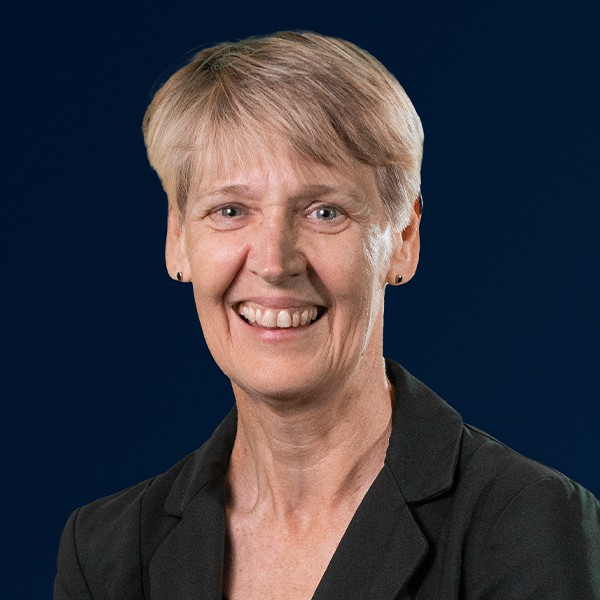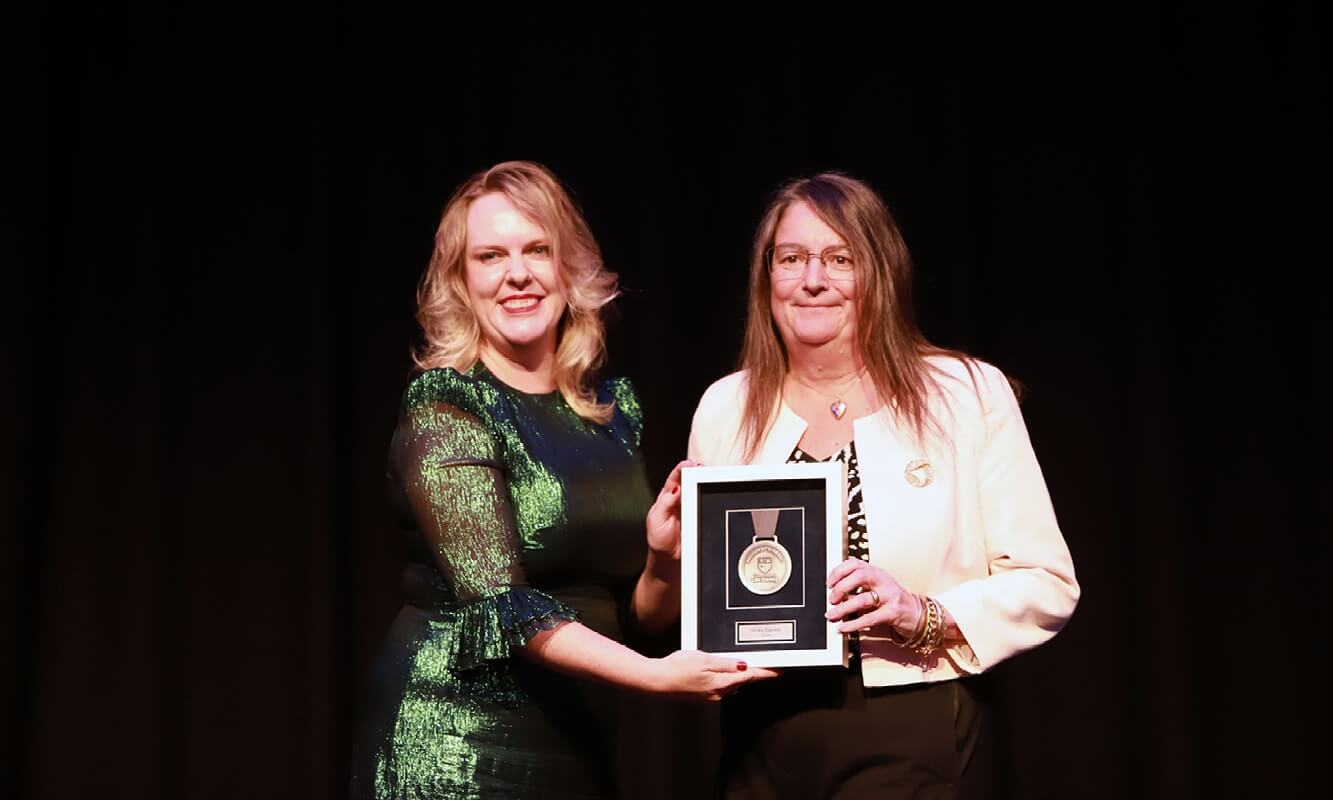Earlier this year, a self-proclaimed “humble family lawyer” received Queensland Law Society’s highest honour – the President’s Medal.
Legal Aid Queensland CEO Nicky Davies, who is also a family lawyer and independent children’s lawyer, has been with the organisation for almost three decades.
Before becoming CEO, Nicky spent about 17 years heading up the Family Law Division and saw the difference that could be made.
She has made changes and is passionate about providing services to vulnerable Queenslanders. Nicky followed her heart, and her husband, to Australia as never looked back.
Nicky shared her journey and hopes for LAQ during the latest The Callover podcast with Georgia Anthasellis.
Some highlights below:
What sort of matters does Legal Aid take on?
“We take on matters in family law, child protection, domestic and family violence, criminal law, and then in a number of civil law areas such as employment and discrimination and NDIS appeals and disaster work is a disaster nearly every year in Queensland. So that is a big portion of our work and anti-discrimination. That said, there’s a number of civil areas where we provide services.”
What are the benefits of being a preferred provider?
“So the the benefits are that you get to do some really interesting work in areas of law that might not normally come over your front door in a private legal practice. In addition, we also provide training opportunities and development opportunities for all preferred suppliers, as well as our in-house staff. We have a set of case management standards which really just steps people through how to do a court case in all our different areas of law, and that for less experienced lawyers who are sort of learning that’s a really good tool in terms of the way that they should be actually delivering the services for vulnerable clients.”
Opportunities for young lawyers and law students. What’s available at Legal Aid?
“We’ve got a formal graduate program and it’s both mainstream and for First Nations students or newly admitted lawyers. And so that’s a formal program based in Brisbane and several of our regional offices as well. In addition to that, there’s lots of opportunities for people to come and work in a contact centre or as litigation support offices whilst they’re doing their law degrees and be exposed to some legal issues and our clients and the challenges that they have.
And then once somebody is in the organization, once they become admitted, they may be have opportunities to either through expressions of interest or formerly advertised positions to actually join as a lawyer then.”
You started in the family law team. Was that always an area of interest or did you how did you find your feet there?
“So if we go back a step, when I was in the United Kingdom, I actually worked in three different law firms there. And when I did my articles, I did a whole range of legal areas. And from that stage I knew that family law was one of the areas that I wanted to concentrate on. I did some other litigation and some criminal law work as well, and then I became a partner in a firm in Cambridgeshire, and I headed up their litigation department before I came over here.
“And most of the work I did was family law, child protection, domestic and family violence. So when I came over to Australia, I was told that I was going to have to do some retraining to be able to be a lawyer here. So it was quite looking forward to being a part-time student for a while. And then when I got here, I found that I only had to fill in a few forms then I could transfer over, which is what I did, And I landed a job as what was then called a children’s representative in the Family Law team on a temporary contract in Brisbane.”
You’re also an independent children’s lawyer. Can you explain what an independent children’s lawyer is and what role they play?
“So they are in family law proceedings and there’s a very similar role in child protection proceedings. It’s called a separate representative. And essentially they appointed in cases relating to children. So in the family law sphere, it would be whether there’s a dispute between parents about who a child should, should live with or what time or on what conditions they should spend time with either parents or other important people in their lives.
“So not every case has an independent children’s lawyer. It’s really the more contentious and complex matters. And the independent children’s lawyer is there to act in the best interests of the child or children if it’s a sibling group. And so they they don’t act for the child. They don’t act on instructions, but they take account of the views of the child in terms of the way that they conduct the case and submissions that they might make to the court as to what is in their view and on the evidence in the best interests of the children.”
Now, how can someone become an independent children’s lawyer?
“Well, you have to have been in practice primarily in family law for five years. You have to have undertaken national, independent children’s lawyer training for Legal Aid Queensland. Then if you still want to do it, after you’ve done all of that, you then make an application to join the panel and there’s an assessment process that takes place, which essentially is a written application and interview and referee checks. And there’s a panel of experienced independent children’s lawyers and social scientists who make a recommendation and to senior person within legal Queensland as to whether somebody should or should not be appointed to the panel.”
What extracurricular things or experiences should someone who is interested in becoming an independent children’s lawyer do to prepare themselves?
“They could work at Legal Aid Queensland or they could work for potentially one of the preferred providers, particularly one that might have an independent children’s lawyer as a member of their staff or one of their partners to be able to get exposed to some of those workings of of of the role. Also, there’s training that is provided by Legal Aid Queensland in family law and child protection and domestic and family violence.
“I would recommend people attend. Most of them are done by webinar or recorded as well as face to face, and that will give a good flavour of the types of matters in which legal aid is involved and then matters where independent children’s lawyers within the big legal aid cohort are involved.”
And would you recommend it to others who are thinking of it?
“Yes, if you like dealing with lots of material and distilling the issues down and trying to get things down to a clear case as to what what are the issues concerning people and what are the orders and other supports that can be put in place to make things as safe and secure for children as possible? If that is something that you would find interesting, then it’s certainly a job for you and there’s a lot of satisfaction from being able to help families to actually sort matters through most of the matters where there are independent children, they don’t go to a final hearing.
“The independent children’s lawyer helps usually the parents, to look at the evidence that is available and come to some agreement and arrangements that are going to make sure that the children are safe as possible.”
Moving to your appointment as CEO. How has your day-to-day work changed since you took on that role?
“Significantly. I haven’t been to court since then, but not to actually represent anybody in court, So I moved from, I suppose, mainstream legal practice into running an organization which has got a significant budget from both the Commonwealth and the state governments. We’ve got over 700 people that work for us. So dealing with all of the HR issues and workforce issues, particularly in the last couple of years where it’s been very difficult to recruit people and I’m looking at finances and IT, and all of those sort of things that you didn’t necessarily do when you were a practicing lawyer.”
I imagine both the caseload and the content of the work at Legal Aid can be confronting and difficult to manage. How have you protected your wellbeing over the years, and how does Legal Aid encourage others to do the same?
“So for a number of years now, legally, Queensland has had quite a sophisticated support system in terms of psychological wellbeing for our staff. And it’s not just the lawyers, it’s litigation support officers, grants offices, people in contact centre who deal with people on a daily basis. We’ve got a lot of challenges and issues in their lives, so we have a vicarious trauma program which helps people to look after themselves, gives us some strategies about how to deal with difficult clients or clients that may be suicidal or something like that.
“So there’s quite a program and people regularly go to those sessions either as a team or individually. I certainly still go along to those and we have an employment assistance program which will provide confidential counselling for people who feel that they would benefit from that. So there are various strategies in place and the team structure is also quite a supportive structure in terms of the some people who’ve been around Legal Aid for a long time.
“And that they provide support and assistance both on a day to day basis, solve and legal tactics in the law generally, but also in terms of dealing with our clients and keeping ourselves safe.”
And what is one thing that you most want to achieve as CEO of Legal Aid Queensland?
“To try and deliver as many quality services as we can around Queensland? It’s a challenging state for service delivery. Yes, both in terms of its size, but also it’s the state that has got the largest proportion of the population outside of the main metropolitan area. More than 50 per cent of Queenslanders live to south east Queensland and so we have to try and deliver those services through our network to those people.”
Nicky receiving the President’s Medal.
Earlier this year you were awarded the Queensland Law Society’s President’s Medal. What did that award mean to you?
“Well, it was a very humbling thing to receive and I think it’s acknowledgment of Legal Aid Queensland as an organization, but also the whole legal assistance sector. And I think that the work that is done around Queensland by ourselves, I prefer supplier partners, community legal centres, the First Nations legal services is remarkable in terms of getting to so many people who are in difficult circumstances right around the state.”
And what is one piece of advice you would give to your younger self at the beginning of your career?
“Probably it would be don’t necessarily have a firm plan if you find an area of law that you enjoy or you find rewarding, then certainly concentrate your career on that and you’ll focus on that. But don’t be surprised where it takes you. I would not have expected that I would have come from an article clerk in Worcestershire to somewhere just outside London to Cambridgeshire to Brisbane. Yeah, I wouldn’t I would never have thought that.
“Take the opportunities when they arise.”
Listen to this episode of The Callover.














Share this article